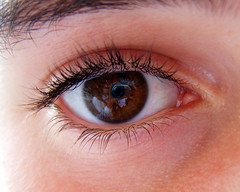Claudette Young’s Take:
She was such a solemn little thing, sitting as she was in the grocery cart seat, staring out at the world with sorrow filling her eyes. I wondered what her life was like if this was her reaction to the hustle of shoppers and carts closing in on her in the store. I wondered what caused this look of tragic numbness in the eyes of this girl of three or four years old.
My reaction to this child was the same as always. First the recognition of the “look,” followed by great sadness of my own to ride in tandem with what those eyes revealed, followed closely by regret that I could do so little to remove the emotion from the eyes that saw the world through that veil.
Do the eyes act as a window to the soul? Or, is it the mouth that reflects the soul’s condition? Each assertion has merit.
The little girl I wrote of was real. I saw her a few days ago at the grocery store. Nothing else struck me about her in particular. I know that she had light brown hair, a long oval face, pale skin, and a lean, elongated body. I know she made no sound the entire time I was in her vicinity, nor did she move.
Would her voice or another expression on her lips have changed the impression of great sorrow that exuded from her? I don’t think so, personally.
What does a mouth portray? One can pout, and many do, quite effectively. And what is a pout? One dictionary defines it as: pout–Push one’s lips or one’s bottom lip forward as an expression of petulant annoyance or in order to make oneself look attractive. Another adds a qualifier of: expression of displeasure.
The mouth can express anger in many forms from slight annoyance to rage. Sarcasm is easily seen as a slight sneer or smirk. Irony, joy, hatred, maliciousness, and most other emotions find expression on our lips. But does emotion reveal our souls?
I see emotion as a momentary reaction to an immediate situation, or as a continued reaction to untenable/highly enjoyed circumstances. Unless the emotion is strong and persistent without relief, I do not see it as a reflection of the soul. The soul/spirit is the core of the being.
A constant expression of emotion in the muscles of the mouth can only cause those muscles to become habituated to that one expression; let’s say displeasure or crankiness, which turns down the corners of the mouth. To say that this is a reflection of the soul might be very erroneous.
The eyes express something far deeper within the being. They are the surface of the pool of being within the body that carries it. They are a reflection of all that the soul has seen and responded to, as well as the spirit’s personal sense of responsibility for what is seen.
This is my assessment of soul’s reflection through eyes that communicate only with truth, for they have not learned to lie.
Meena Rose’s Take:
Today’s challenge was to contemplate the notion of eyes, souls and windows. Specifically, “Is the eye a window for the soul?”
Before I go into my take on this question, I want to ask a couple of questions. Have you ever had the experience of drowning in someone else’s eyes? How trying you best to avoid the gaze of another person with the seemingly irrational fear of being turned into stone or worse? And, how about the discomfort and sometimes anger you feel when someone refuses to look you in the eye?
I suppose since I am posing these questions, I best answer. Yes, I have had all these experiences and not just read about them in works of fiction. Now that I think about it, I have even had the experience of recognizing those “knowing” eyes. You know the ones. These are the ones where you know not to even attempt to saying anything superficial before irrespective of the age of the person to whom those eyes belong.
I think immediately behind the eyes lies the Sentinel to the soul. It is this Sentinel which demands recognition in another – it is what feels discomfort, anger or anxiety when another party refuses to “look it in the eye” and acknowledge its presence.
The eye is indeed a window to that which lies beyond. All windows allow for perception from either side with percentage reflection back on to the observer. When the Sentinel is alert and engaged and purposefully seeking connection, it often times intimidates those on the other side. The inarticulate reaction to the “pull” of the Sentinel is almost always to avoid its gaze out of fear that the other person’s Sentinel may entrap our own.
By the same token, when the two Sentinels (observer and observee) connect at that deep level, a sense of knowing and near immediate empathy sets in. Even third party observers can acknowledge that something deeper is in progress and that they are not privy to it.
When that Sentinel is assured that the other person fits the bill, the will excuse themselves as an intermediary between the soul and the other person. This is when you drown in someone else’s gaze. You have been invited into the inner most sanctum of Oneness.
At times, we run into “knowing” eyes who care not who sees deep into their experience. This typically catches passersby unaware. In a flash, they are ensnared. The decision is up to them whether or not they want to acknowledge the view through the window of that person’s soul.
I will admit that I am quite unread in this regard. I am simply relaying how I relate to the world around me and me experiences therein.
Related articles
- Pool of Souls (santoshparamsivam.wordpress.com)
- ‘Soul Tears’ (beckygitonga.com)
- Thought Ripples on Writing and Emotions (2voices1song.com)

